3MT 2021
Biochemistry, Molecular and Cell Biology Ph.D. Candidate Wins Three Minute Thesis Competition
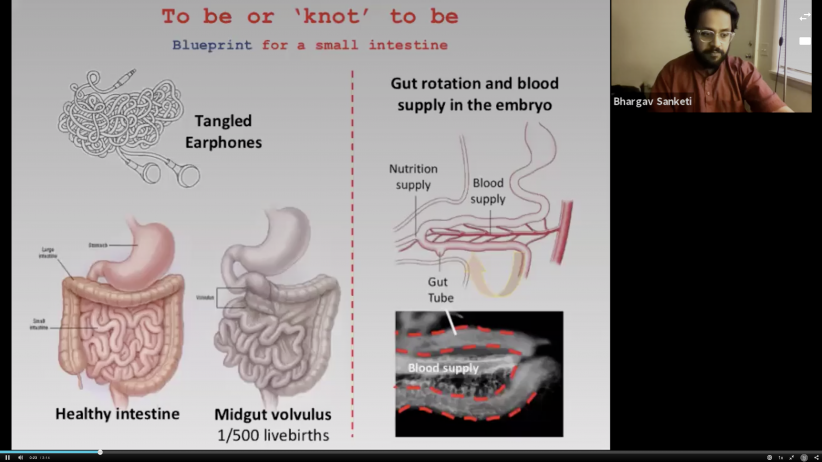
“My thesis explores the blueprint behind building a small intestine. I call it ‘to be or “knot” to be’,” began Bhargav Sanketi, a doctoral candidate in biochemistry, molecular and cell biology, at the sixth Cornell University Three Minute Thesis (3MT) competition.
Alongside seven other finalists, Sanketi presented his dissertation research in just three minutes to a panel of judges and an audience from across campus. Presentations were judged by how clearly and compellingly they summarized their research using only one static slide to a general audience.
His presentation, “To be or ‘knot’ to be: Blueprint for a small intestine,” earned him first place and $1,500. Second place and $1,000 was awarded to food science and technology doctoral candidate Rachel Allison for her presentation, “What CAN we do about stinky wine?”
After nearly 200 audience members cast their ballots, votes were tallied and the People’s Choice Award and $300 were presented to entomology doctoral candidate Kara Fikrig for her presentation, “Are mosquitoes picky eaters?”
Having enjoyed the 3MT as an audience member in the past, Sanketi appreciated the opportunity to participate in – and win – this year’s competition.
“I think as scientists, we get so lost in our work that it’s easy to lose sight of what’s important,” he said. “I had attended previous editions of 3MT and always found them really entertaining. The idea of getting a diverse audience excited about a pretty heavy academic topic forces you to zoom out and see the big picture.”
For Allison, undertaking the challenge of distilling a dense topic into accessible and engaging content was a primary motivator for her participation.
“Going through the job interview process, I realized how challenging it could be to communicate my research experience to a non-specialist audience,” she said. “My career goal is to one day combine technical and business consulting in the wine industry, and adaptable communication skills will be essential. As a result, I have been trying to practice by taking advantage of more speaking opportunities.”
The 3MT competition was first held in 2008 at the University of Queensland and has since been adopted by over 600 graduate schools in over 65 countries. 3MT challenges research degree students to present a compelling story on their dissertation or thesis and its significance in just three minutes, in language appropriate to a non-specialist audience.
Cornell’s Graduate School first hosted a 3MT competition in 2015. The event has grown steadily since that time and this year, Cornell’s winner will compete in the Northeastern Association of Graduate Schools regional competition next month, and the top two winners from that event will showcase their research at the Council of Graduate Schools annual meeting in December 2021.
“I am so impressed with each and every one of this year’s competitors,” said Jan Allen, associate dean for academic and student affairs. “They are all to be recognized for their successful presentations. In addition to presenting their complex research in just three minutes, everyone rose to the challenge of doing so in a virtual format. These skills will prove beneficial in academic work as well as in future careers.”
Understanding the importance of communicating scientific topics clearly, Fikrig looked at the 3MT as a way to learn techniques for getting and holding listeners’ attention when sharing her research broadly.
“I value science communication and recognize the importance of being able to explain my science in a way that is both comprehensible and interesting to the public. This is especially true since I study mosquitoes – the threat of disease transmission underscores the need to effectively communicate about my study system,” she said. “After watching videos of past 3MT presenters, I thought that the competition would be a great opportunity to learn and practice science communication skills. And I was not disappointed!”
Cornell’s sixth 3MT final round competition was held on Thursday, March 18, 2021 at 4:15 p.m. on Zoom.
This story is also available on the Cornell Chronicle website.
Spring 2021 3MT Finalists
Watch the 2021 Three Minute Thesis competition finale.
First Place: Bhargav Sanketi, biochemistry, molecular, and cell biology doctoral candidate
Watch Bhargav Sanketi’s 3MT presentation.
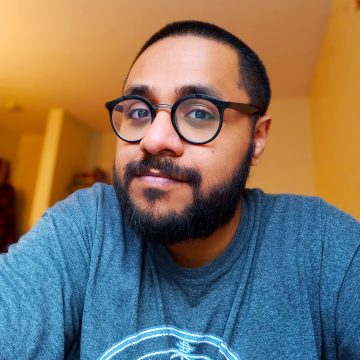 Presentation Title: “To be or ‘knot’ to be – blueprint to a small intestine”
Presentation Title: “To be or ‘knot’ to be – blueprint to a small intestine”
Special Committee Chair: Natasza Kurpios
Area of Research: Developmental biology of the small intestine
Biography: Bhargav Sanketi is a Ph.D. candidate in the Kurpios lab studying how the small intestine obtains its looped structure during development. His investigations use a combination of chicken embryology, mouse genetics, and single cell genomics. Bhargav is from Bangalore, India and spends his free time cooking, writing music, or watching international cinema.
Favorite Thing About Cornell: All the waterfalls and gorges nearby.
What did you learn from the 3MT? How did it help you?
I think as scientists, we get so lost in our work that it’s easy to lose sight of what’s important. I had attended previous editions of 3MT and always found them really entertaining. The idea of getting a diverse audience excited about a pretty heavy academic topic forces you to zoom out and see the big picture. It feels nostalgic, like the first time I started thinking about the project and the analogies I used to understand it better.
Second Place: Rachel Allison, food science and technology doctoral candidate
Watch Rachel Allison’s 3MT presentation.
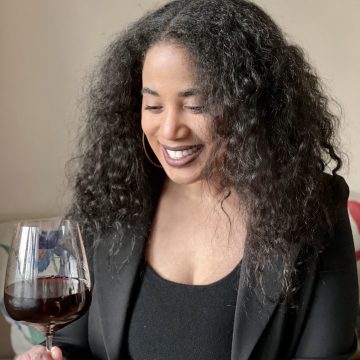 Presentation Title: “What CAN we do about stinky wine?”
Presentation Title: “What CAN we do about stinky wine?”
Special Committee Chair: Gavin Sacks
Area of Research: Wine flavor chemistry
Biography: Rachel Allison is a Ph.D. candidate and aspiring consultant in the field of food science. With a focus in wine flavor chemistry, her research looks at the development of reductive off-aromas during wine storage, particularly related to the stability of enological treatments with copper and interactions between wine and aluminum can packaging.
Favorite Thing About Cornell: Curiosity is always encouraged.
What did you learn from the 3MT? How did it help you?
Going through the job interview process, I realized how challenging it could be to communicate my research experience to a non-specialist audience. My career goal is to one day combine technical and business consulting in the wine industry, and adaptable communication skills will be essential. As a result, I have been trying to practice by taking advantage of more speaking opportunities.
I credit my lab group for helping me to develop my presentation skills over the last few years. I have always received insightful feedback from my friends and colleagues, and they encouraged me to participate in the 3MT. I received many different perspectives so I learned to interpret and condense a lot of presentation lessons alongside building the thesis story. Every comment helped me to construct an effective final product. I’m sure the experience will help me as I write my thesis.
People’s Choice: Kara Fikrig, entomology doctoral candidate
Watch Kara Fikrig’s 3MT presentation.
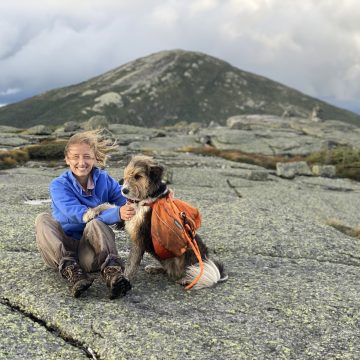 Presentation Title: “Are mosquitoes picky eaters?”
Presentation Title: “Are mosquitoes picky eaters?”
Special Committee Chair: Laura Harrington
Area of Research: Mosquito feeding ecology
Biography: Kara Fikrig studies mosquito feeding behavior and hopes that her research will help public health efforts to reduce global suffering from mosquito-borne diseases. She believes that science communication is critical to achieve that goal. As such, she is dedicated to ensuring that science is understood and valued by the public and elected representatives.
Favorite Thing About Cornell: The easy access to beautiful nature!
What did you learn from the 3MT? How did it help you?
First, I would like to thank my family, friends, and lab for their support, both during this competition and throughout my development as a scientist.
I decided to participate in the 3MT competition because I value science communication and recognize the importance of being able to explain my science in a way that is both comprehensible and interesting to the public. This is especially true since I study mosquitoes – the threat of disease transmission underscores the need to effectively communicate about my study system.
After watching videos of past 3MT presenters, I thought that the competition would be a great opportunity to learn and practice science communication skills. And I was not disappointed! I learned new techniques, such as portraying enthusiasm despite being nervous, and had the opportunity to practice techniques that I had learned previously, like employing a hook to grab the listeners’ attention and using relatable metaphors. It was challenging to condense my project into three minutes – but the process of doing so helped me to realize that many of the details that I considered crucial were in fact unnecessary to understand the overarching message. The skills that I developed through participating in the 3MT competition will help me to more effectively and confidently communicate my science in the future. And I’m sure that the condensed explanation of my work will come in handy once social gatherings begin again!
Xiangkun (Elvis) Cao, mechanical engineering doctoral candidate
Watch Xiangkun (Elvis) Cao’s 3MT presentation.
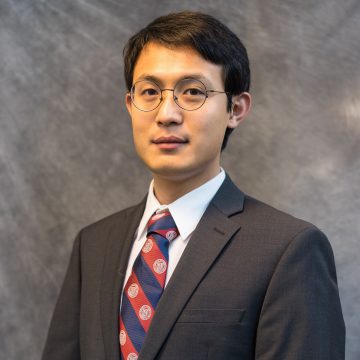 Presentation Title: “Turning our carbon liability into an opportunity”
Presentation Title: “Turning our carbon liability into an opportunity”
Special Committee Chair: David Erickson
Area of Research: Artificial photosynthesis, solar fuels, CO2 conversion
Biography: Xiangkun (Elvis) Cao is a Ph.D. candidate in mechanical engineering working on artificial photosynthesis at Cornell University. He is a Lindau Nobel Alumnus (2020), UNICEF Young Changemaker on Sustainable WASH Solutions (2020), Forbes 30 Under 30 Honoree (2019), and BP Future Energy Leader (2019), among others.
Favorite Thing About Cornell: The ice cream at the Cornell Dairy Bar.
Olivia Graham, ecology and evolutionary biology doctoral candidate
Watch Olivia Graham’s 3MT presentation.
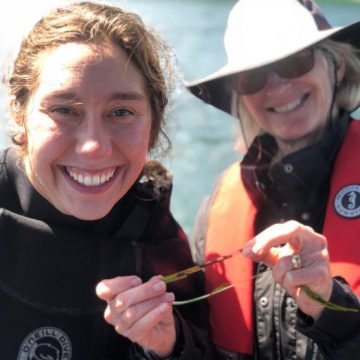 Presentation Title: “Small bugs, big impacts: Herbivores, seagrass, and disease”
Presentation Title: “Small bugs, big impacts: Herbivores, seagrass, and disease”
Special Committee Chair: Drew Harvell
Area of Research: Marine ecology, disease ecology, community ecology
Biography: Olivia Graham is a Ph.D. candidate in Drew Harvell’s lab. By combining field and laboratory approaches, she studies the role of environment and biodiversity—host genetics, herbivores, and microbes—on disease dynamics in seagrass. Outside of all things marine, Olivia enjoys baking, adventures with her puppy, and science communication.
Favorite Thing About Cornell: Cornell is truly an institution where anyone can study anything. The opportunities are boundless, creating a diverse, collaborative learning environment and community.
Jessica Maya, genetics, genomics, and development doctoral candidate
Watch Jessica Maya’s 3MT presentation.
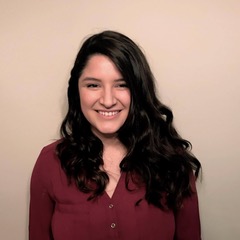 Presentation Title: “Fueling the cells in chronic fatigue syndrome”
Presentation Title: “Fueling the cells in chronic fatigue syndrome”
Special Committee Chair: Maureen Hanson
Area of Research: Immunology and metabolism of chronic fatigue syndrome
Biography: Jessica Maya is a fourth year graduate student originally from Birmingham, Alabama. She has been doing scientific research since high school and has worked on projects involving human diseases for the majority of that time. Maya comes from a big Colombian family, and when she’s not in lab, she enjoys painting, quilting, and salsa dancing.
Favorite Thing About Cornell: My favorite thing about Cornell is how collaborative all of the labs and departments are with each other. The interdisciplinary approach that is fostered here allows for some amazing work to get done!
Seema Singh, city and regional planning doctoral candidate
Watch Seema Singh’s 3MT presentation.
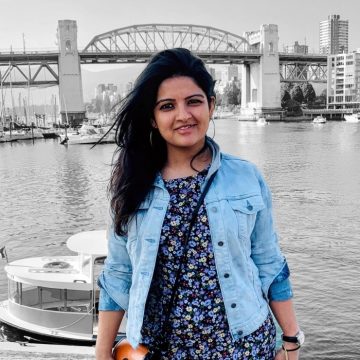 Presentation Title: “Women and transport: What are the planners missing?”
Presentation Title: “Women and transport: What are the planners missing?”
Special Committee Chair: Michael A. Tomlan
Area of Research: Transport planning, gender-sensitive planning, and urban governance
Biography: Seema Singh studies gender and transport linkages in India. She hopes to reduce gender-based inequalities in cities by mainstreaming women’s needs in transport planning and policymaking. She is enthusiastic about sustainable living and was selected as a Young leader in Sustainable Transport in 2019.
Favorite Thing About Cornell: Cornell’s motto: “… an institution where any person can find instruction in any study.”
Alan Sulpizio, biochemistry, molecular, and cell biology doctoral candidate
Watch Alan Sulpizio’s 3MT presentation.
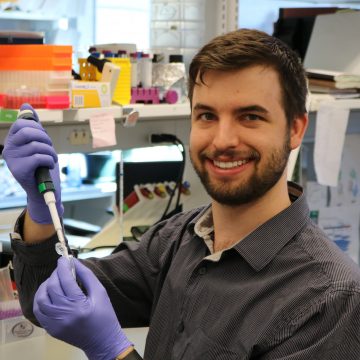 Presentation Title: “Legionella, aliens of the microscopic world”
Presentation Title: “Legionella, aliens of the microscopic world”
Special Committee Chair: Yuxin Mao
Area of Research: Biochemistry and structural biology
Biography: Alan Sulpizio is interested in learning about proteins of unknown function. He considers the infectious bacteria Legionella an excellent organism to study because they use many alien-like protein weapons to hijack our cells. By discovering how these unique legionella proteins act, we can learn more about our biology and potential therapeutics.
Favorite Thing About Cornell: Hiking through the beautiful nature surrounding campus.
